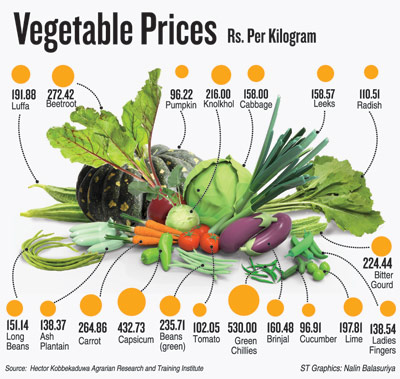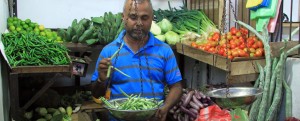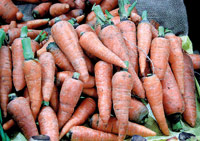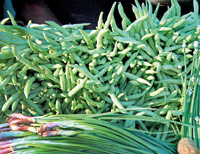News
Veggie prices down, but consumers slow to respond
Trade stalls in urban areas are full of fresh vegetables, a few weeks after their prices skyrocketed as a result of bad weather and resultant shortfall.

W. S. Jacintha: Changed eating habits due to fluctuating prices
“Rupees 160 per kilo, Rs. 160 per kilo,” retail vegetable vendors shout in unison.
This week prices of popular vegetables went down with green beans sold at an average price of Rs. 160 per kilo, carrots at Rs. 170 per kilo, leeks at Rs. 83 per kilo, capsicum at Rs. 309 per kilo, pumpkin at Rs. 44 per kilo and beetroot at 180 a kilo. (See graphic for a comparison with vegetable prices last year)
Though the drop in prices was welcomed by most consumers, vendors complained that consumers are still shying away from buying vegetables.
“When there was a shortage in vegetables reaching cities like Colombo, consumers had to buy what was available. We were able to make a substantial profit then, but now there are enough stocks,” said Prasanna Madduma from Godagama who has been selling vegetables in the Nugegoda retail market for the past 20 years.
He added that now even small scale shops in villages have vegetables for sale and people are not visiting markets to buy their needs as they did when there was a shortage.
T. H. Ariyasena from Gonapola, who has been selling vegetables for the past 30 years in Piliyandala, also said the decrease in prices hasn’t prompted people to buy more vegetables than they did before.
“If the prices continue to go down then it is good for all parties. The current prices are not favourable for the vendors or the consumers,” he said.
It has been a week since W. S. Jacintha, who works at a private company, shopped for vegetables. As she studied the prices displayed at the veggie stalls she noticed there wasn’t a major reduction in prices.
“We keep hoping that the prices of essential food items, especially vegetables, would go down. Since there is no major change we are now buying less of what we bought before,” she said.
Ms. Jacintha said she has made a change in what to cook in keeping with the fluctuating prices of vegetables. “These days we are eating more kekiri (cooking melon), manioc, jakfruit and tender jakfruit (polos).”
Sharing the same opinion regarding the increase in prices of vegetables Lakmal Dissanayake from Piliyandala, working in a marine company, said that vegetables are more affordable than they were two weeks ago but the prices have not dropped significantly.
“They have gone down by Rs. 10 to Rs. 15 but that has not made a big impact. When the prices were high we somehow adjusted to it,” he said.
According to the Hector Kobbekaduwa Agrarian Research and Training Institute (HARTI), the prices of vegetables will continue to come down till March.
HARTI’s Statistical Officer Upul Aruna Shantha said that the Maha harvesting season has commenced, so there won’t be a shortage of vegetables while the prices will get reduced.

T. H. Ariyasena: Selling vetables in Piliyandala for the past 30 years
Vegetables such as pumpkin, kekiri, brinjals, long beans and bitter gourd will reach the market from this month and potatoes should reach the market next month.
“However, in April the prices will go up again because there is a high demand for vegetables during the National New Year,” Mr. Shantha said. He predicted that in June the prices of vegetables will be at their highest.
“June is the month where vegetables are normally pricey,” he explained.
Mahasen Govi Sanvidanaya President R. M. Ratnayake said vegetable prices increased due to bad weather during the last few months affecting the harvest.
“The weather is still not satisfactory. Farmers are also burdened by fertiliser prices, which should be reduced. As a result the farmers have suffered,” Mr. Ratnayake said.
An Agriculture Department official said there is a change in rain patterns in Sri Lanka and farmers have been advised to adjust to it.
Farmers are being given technical support and advice to adapt to the change in climatic patterns and obtain the maximum harvest possible.

Though the drop in prices was welcomed by most consumers, vendors complained that consumers are still shying away from buying vegetables. Pix by Indika Handuwala

Lakmal Dissanayake: Veggies more affordable than 2 weeks ago


Prices of popular veggies such as carrot and beans were down this week

